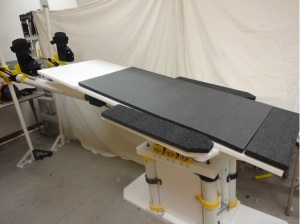3D-printed surgical table costs $4,000, geared toward low-resource settings
por John R. Fischer, Senior Reporter | July 21, 2022
Business Affairs
Operating Room

The 3D-printed table costs under $4,000 to make and is meant for use in low-resource countries.
Western University in London, Canada has teamed up with Michigan Tech University to create a cost-friendly, 3D-printed surgical fracture table for providers in low-resource countries.
Because financial challenges prevent healthcare practices in underserved countries from being able to afford high-quality equipment, the researchers made the table under $4,000 to design. This is a 98.5% savings compared to conventional models, which often go for more than $250,000.
The design has an open-source license and is freely available for manufacturers to build and sell tables directly to surgeons and other providers, who can make modifications and add further attachments themselves or request them.

 The table can also be built and used for providers in more affluent locales, but because it’s specifically designed for low-resource settings, it is manually adjusted rather than electronic, says Joshua Pearce, chair in information technology and innovation at Western University.
The table can also be built and used for providers in more affluent locales, but because it’s specifically designed for low-resource settings, it is manually adjusted rather than electronic, says Joshua Pearce, chair in information technology and innovation at Western University.
“The open-source surgical fracture table was designed to be distributedly manufactured using off-the-shelf parts and custom parts made with a desktop 3D printer,” he told HCB News. “The latter was the real secret, as it allowed precision fabrication of custom radiolucent (permeable to X-rays) components for the surgical zones for a few dollars apiece instead of thousands of dollars to have them machined.”
Surgeons can complete a wide range of orthopedic procedures on the table, as well as general surgery, gynecological operations and child birthing. They can treat fractures, place external fixators, drain septic arthritis, debride osteomyelitis, and perform escharotomy/fasciotomy and trauma-related amputations.
Instructions include step-by-step techniques for building the table with open-source hardware and 3D printing. The design was developed as part of an ongoing Western University frugal biomedical innovation project, which aims to address inequities in Canadian and global health with new biomedical devices.
“We hope to create a clear path to a new paradigm in medical tech, where hospitals themselves can fabricate the regulated devices they need from digital plans, and then use freely shared testing procedures to validate them,” said Pearce.
The research and design were published in PLOS ONE.
Because financial challenges prevent healthcare practices in underserved countries from being able to afford high-quality equipment, the researchers made the table under $4,000 to design. This is a 98.5% savings compared to conventional models, which often go for more than $250,000.
The design has an open-source license and is freely available for manufacturers to build and sell tables directly to surgeons and other providers, who can make modifications and add further attachments themselves or request them.
Your Trusted Source for Sony Medical Displays, Printers & More!
Ampronix, a Top Master Distributor for Sony Medical, provides Sales, Service & Exchanges for Sony Surgical Displays, Printers, & More. Rely on Us for Expert Support Tailored to Your Needs. Email info@ampronix.com or Call 949-273-8000 for Premier Pricing.

“The open-source surgical fracture table was designed to be distributedly manufactured using off-the-shelf parts and custom parts made with a desktop 3D printer,” he told HCB News. “The latter was the real secret, as it allowed precision fabrication of custom radiolucent (permeable to X-rays) components for the surgical zones for a few dollars apiece instead of thousands of dollars to have them machined.”
Surgeons can complete a wide range of orthopedic procedures on the table, as well as general surgery, gynecological operations and child birthing. They can treat fractures, place external fixators, drain septic arthritis, debride osteomyelitis, and perform escharotomy/fasciotomy and trauma-related amputations.
Instructions include step-by-step techniques for building the table with open-source hardware and 3D printing. The design was developed as part of an ongoing Western University frugal biomedical innovation project, which aims to address inequities in Canadian and global health with new biomedical devices.
“We hope to create a clear path to a new paradigm in medical tech, where hospitals themselves can fabricate the regulated devices they need from digital plans, and then use freely shared testing procedures to validate them,” said Pearce.
The research and design were published in PLOS ONE.
You Must Be Logged In To Post A CommentRegistroRegistrarse es Gratis y Fácil. Disfruta de los beneficios del Mercado de Equipos Médicos Nuevos y Usados líder en el mundo. ¡Regístrate ahora! |
|










